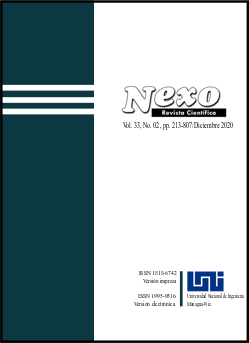Evaluation of meliloti rhizobium activity effectiveness on quantitative properties of alfalfa by bacterial inoculation in the south-east of Iran
DOI:
https://doi.org/10.5377/nexo.v33i02.10804Keywords:
Alfaalfa, Rhizobium, Picking, Bacterial InoculationAbstract
In order to investigate the effect of bacterial inoculation on yield, chlorophyll and protein content of alfalfa to obtain economically experimental products in Shahid Zande Rouh Agricultural Training Center in Kerman as a split plot in time based on a completely randomized block design with four replications on the ground Which had not been done before, was done. Bacterial inoculation was at three levels (Rhizobium meliluti, Rhizobium leguminasarum and no inoculation as a control). Bacterial inoculation had a significant effect on all studied traits and caused an increase in chlorophyll content, yield and protein percentage. In terms of fresh forage weight, the first and third crops had the highest yield with the application of Rhizobium meliloti (6 tons per hectare). The highest percentage of protein related to inoculation of Rhizobium meliloti was observed in the second Picking. According to the results of this study, inoculation with Rhizobium meliloti bacteria increases the ability of nitrogen fixation 3 to 4 times compared to the control and improved the alfalfa traits of Bami cultivar in southeastern Iran.
Downloads
Downloads
Published
How to Cite
Issue
Section
License
Copyright (c) 2021 Array

This work is licensed under a Creative Commons Attribution 4.0 International License.
The authors who publish in Nexo Scientific Journal agree to the following terms:
- Authors retain the copyright and grant the journal the right of the first publication under the license Creative Commons Attribution License https://creativecommons.org/licenses/by/3.0/, which allows others to share the work with a recognition of the authorship of the work and the initial publication in Nexo Scientific Journal.
- Authors may separately establish additional agreements for the non-exclusive distribution of the version of the work published in the journal (for example, in an institutional repository or a book), with the recognition of the initial publication in Nexo Scientific Journal.
- Authors are allowed and encouraged to disseminate their works electronically (for example, in institutional repositories or in their own website) before and during the submission process, as it can lead to productive exchanges, as well as earlier and greater citation of published works.











